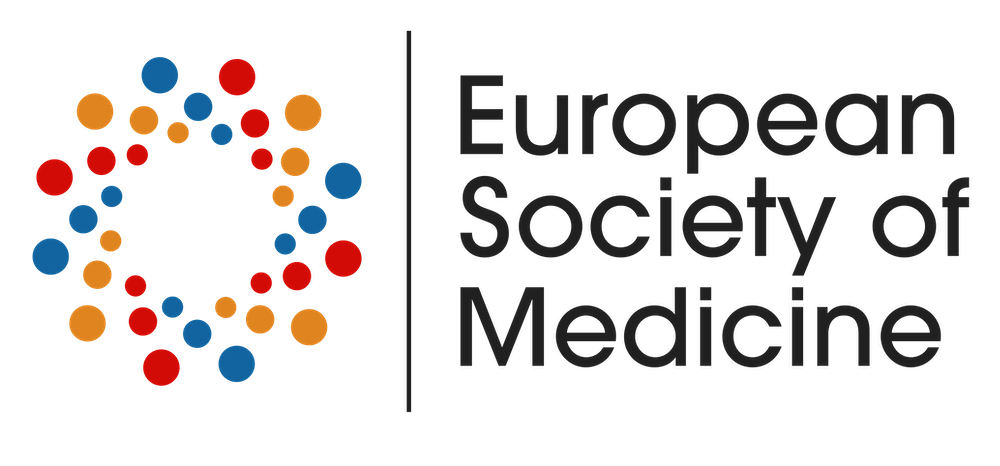- +91 8471002000
- Messenger
test kidney cancer
meta desc
heading 2
content2
heading 3
content3
Why Choose Art of Healing Cancer

Blending traditional and modern treatments, we offer a holistic approach to cancer care.
Through chemosensitivity planning, we customize chemotherapy to each patient’s unique needs.
Precision and improved outcomes are hallmarks of our state-of-the-art robotic surgery techniques.
Utilizing genomic and transcriptomic data analysis, we provide the most advanced targeted therapy options.
As the only institution in India combining genomic and transcriptomic data with natural and herbal treatments, we offer comprehensive care.
We offer the most advanced immunotherapy treatments, including tailored vaccines and sensitivity testing to immunotherapy drugs.
One of the only centres trained on exploiting tumor Metabolism
heading 4
content4

DR. MANDEEP SINGH MALHOTRA
- Surgical and Molecular Oncologist is the Chief Mentor at Art of Healing Cancer, with over 20 years of clinical oncology experience.
- He is MBBS(MAMC) and MS Surgery (GMC)
- Trained in surgical oncology at All India Institute of Medical Sciences, Delhi, and gained international experience in the UK, USA, and Europe during his Fellowships in Head Neck Oncology; Breast Oncoplasty; Robotic Surgery and Molecular Oncology Certification
- Experienced Robotic Surgeon, he is one of the pioneers for Robot Assisted Functional Breast Preservation.
- Molecular Oncology Certification from RGCC College Europe
- Expert in Advanced and Recurrent Cancer Treatment, utilizing Precision Oncology Techniques such as NGS, Transcriptomics, Tumor Vialbility assays and mapping them to plan Chemotherapy, Immunotherapy and Traditional / Off label medicine & Metabolic Therapy

DR. MOHIT SAXENA
- Senior Consultant in Medical Oncology with over 10 years of experience at Marengo Asia Hospitals, Gurugram.
- Holds MBBS and MD degrees from Sawai Man Singh Medical College, Jaipur; specialized in Medical Oncology from Gujarat Cancer & Research Institute, Ahmedabad.
- Expert in immunotherapy, various chemotherapy techniques (intravenous, intrathecal, oral), targeted therapy, precision medicine, and hormone therapy.
- Skilled in treating cancers of the head & neck, breast, lung, GI tract, hepatobiliary system, and genitourinary organs.
- Published multiple papers in respected national and international journals on cancer research.
- Previous roles include Artemis Hospital and C.K. Birla Hospital, highlighting extensive clinical experience.
- Known for research in hematological malignancies and advanced cancer treatment methods.

DR. SIDDHARTH SAHAI
- He is a medical Oncologist with 11+ years of experience.
- Siddharth has done MBBS from Maulana Azad Medical College, MD from Lady Harding Medical College, DM in Medical Oncology from AIIMS, New Delhi.
- Cleared ESMO Certification in 2013; trained in chemotherapy, immunotherapy, targeted therapy, and comprehensive oncology care.
- Focuses on solid tumors including head & neck, thoracic, breast, GI tract, hepatic, genitourinary malignancies, sarcomas, and brain tumors.
- Active member of ASCO, ESMO, SOMOI, ISMO.
- Worked at Venkateshwar Hospital, FMRI, Paras Hospital, Manipal Hospital, Max Hospital in New Delhi and Gurugram, India.

DR. RITESH SHARMA
- Dr. Ritesh is a senior Consultant Radiation Oncologist at Batra Hospital, Delhi, Dr. Ritesh Sharma.
- He has been trained at Rajiv Gandhi Cancer Institute, Delhi, and Max Cancer Center, Saket.
- 13 years of experience in Radiation Oncology.
- Specializes in SRS/SRT for brain tumors, SBRT for lung, liver, and spine, and hypofractionation for various malignancies.
- Proficient in 4D CT for treating moving tumors and brachytherapy for various cancers.
- Education includes MBBS and MD in Radiotherapy from Gandhi Medical College, Bhopal.
- Involved in research with several published papers.
head 5
The AOHC Chemotherapy Daycare is unique for integrating a Hyperbaric Oxygen Chamber with chemotherapy, enhancing patient recovery. It also offers additional treatments like IV Vitamin C, promoting a holistic approach to cancer care.
Personalized Chemotherapy through Chemosensitivity / Tumour Viability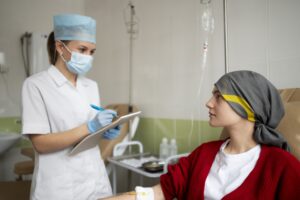
- Culturing Cancer Cells: Isolate and grow cancer stem cells in a lab to replicate the tumor environment.
- Drug Exposure: Introduce chemotherapeutic drugs to the cultured cells to test their effectiveness.
- Inhibition Assessment: Measure the drugs’ ability to inhibit cancer cell growth or induce cell death, guiding treatment choices. The results provide valuable insights into which chemotherapeutic agents are likely to be most effective in treating the specific cancer type, potentially guiding personalized treatment plans for patients.
HBOT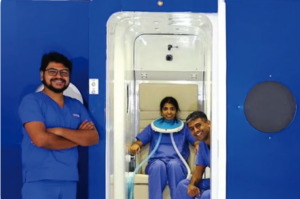
- HBOT mitigates tumor hypoxia, reducing cancer progression and resistance by enhancing tissue oxygenation.
- Increased plasma oxygen through HBOT reaches areas typically inaccessible to red blood cells, diminishing cancer cell advantages.
- HBOT, when paired with chemotherapy, boosts treatment efficacy by elevating ROS levels, especially effective if chemotherapy follows HBOT.
IV VITAMIN C
- Our organization administers high-dose IV Vitamin C at our chemo daycare facility, significantly enhancing serum vitamin C levels to target cancer cells effectively.
- By incorporating IV Vitamin C, we potentiate chemotherapy’s effectiveness, leveraging its ability to increase the cytotoxic impact on tumor cells while aiming to reduce treatment side effects.
- This integrated approach, supported by extensive research, underscores our commitment to providing advanced, comprehensive cancer care at our daycare facility.
Publications
International journal of Complementary and Internal Medicine
Impact of Slow- Infusion (Metronomic) 2-Deoxy-D-Glucose in Treatment of Refractory Patient of Gliobalstoma Multiforme
Cost of Kidney Cancer Treatment
The cost of kidney cancer treatment can vary widely depending on the type and stage of the cancer, the treatment approach, and the hospital or medical facility chosen. Below is a general breakdown of approximate costs for various treatments and services related to kidney cancer care.
- Consultation and Diagnostic Tests:
- Initial consultation with an oncologist or urologist: INR 1,000 to INR 3,000 per session.
- Diagnostic imaging (CT, MRI, ultrasound): INR 5,000 to INR 25,000 per test.
- Biopsy (if needed): INR 15,000 to INR 50,000.
- Surgical Treatment:
- Partial Nephrectomy (removal of part of the kidney): INR 2,00,000 to INR 5,00,000.
- Radical Nephrectomy (complete removal of the kidney): INR 3,00,000 to INR 7,00,000.
- Laparoscopic or robotic-assisted surgery may increase the cost due to the use of advanced technology.
- Initial consultation with an oncologist or urologist: INR 1,000 to INR 3,000 per session.
- Diagnostic imaging (CT, MRI, ultrasound): INR 5,000 to INR 25,000 per test.
- Biopsy (if needed): INR 15,000 to INR 50,000.
- Partial Nephrectomy (removal of part of the kidney): INR 2,00,000 to INR 5,00,000.
- Radical Nephrectomy (complete removal of the kidney): INR 3,00,000 to INR 7,00,000.
- Laparoscopic or robotic-assisted surgery may increase the cost due to the use of advanced technology.
- A complete course ranges from INR 1,00,000 to INR 2,50,000, based on session type and number.
- Monthly costs can be INR 50,000 to over INR 1,00,000, depending on medications.
- Often exceeds INR 1,00,000 per dose, potentially spanning several doses.
- Includes side effect management, physical therapy, counseling, alternative therapies, adding significantly to total cost.
- Regular appointments, tests, and monitoring for recurrence are ongoing costs.

Factors Influencing Treatment Costs
Stage of Cancer
Treatment Plan
Personalized Treatment Approaches
head 6
Art of Healing Cancer proudly stands among the first in the nation to offer robotic kidney cancer surgery. This advanced technique enhances precision, reduces recovery time, and minimizes scarring, representing a significant leap forward in surgical oncology and patient care.

head 7
Kidney cancer originates in the kidneys, vital organs for blood filtration and waste management. It occurs when kidney cells grow uncontrollably, potentially forming tumors.
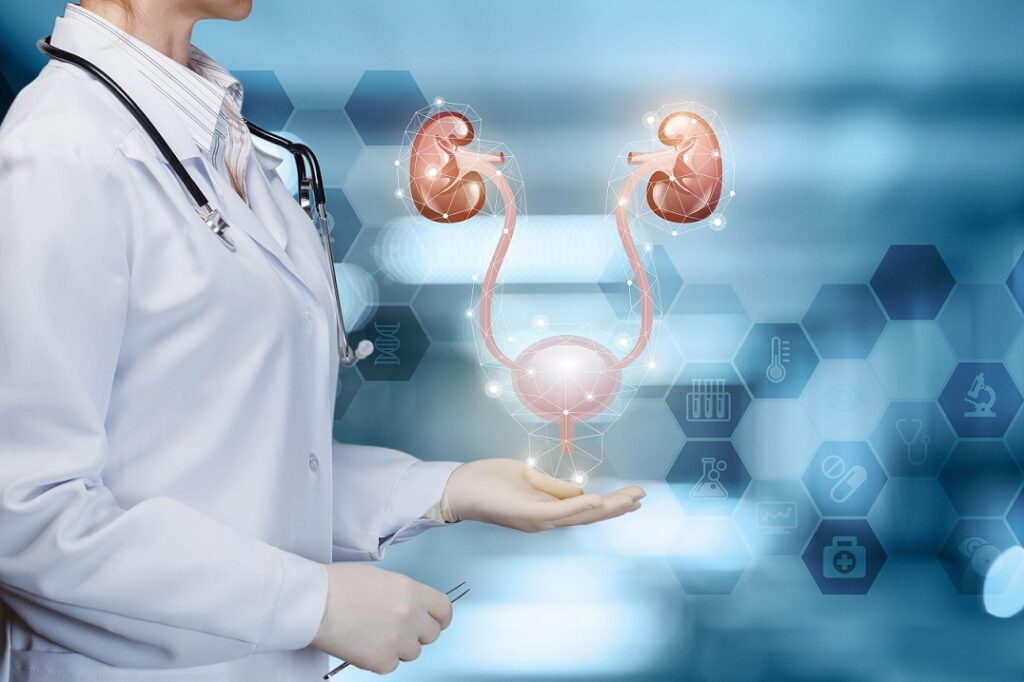
Predominant in adults, originating in the kidney tubules, often as a single tumor, but multiple tumors can occur.
Begins in the kidney’s renal pelvis, similar to bladder cancer. It’s less common in the kidney but affects the area where urine collects.
Most common in children under 5, with a high cure rate. Named after Dr. Max Wilms, who first described it.
A rare cancer starting in the kidney’s blood vessels or connective tissue, less understood due to its rarity.
A subtype of RCC, named for the cancer cells’ pale appearance, accounting for 70-80% of RCC cases.
The second most common RCC subtype, characterized by finger-like projections in the tumors, making up 10-15% of RCC cases.
A rare RCC form, constituting about 5% of cases, generally associated with a better prognosis.
Testing and Screening for Kidney Cancer
- Ultrasound: Uses sound waves to create kidney images, identifying tumours or abnormalities.
- CT scan: X-rays provide detailed images of the kidneys, showing tumors’ size, shape, and location.
- MRI: Offers detailed images using magnetic fields, useful for examining kidney tumour’s complexity.
- CBC: Measures blood cell levels, can indicate anemia related to kidney cancer.
- Urine Analysis: Detects blood or other substances in urine that may suggest kidney cancer.
- Less common for kidney cancer, involves examining a small tissue sample under a microscope. Often avoided due to the risk of spreading cancer cells.
- Recommended for those with a family history or inherited syndromes increasing kidney cancer risk, identifies specific genetic mutations.
- No standard tests for the general population. High-risk individuals may undergo regular imaging tests to detect cancer early.
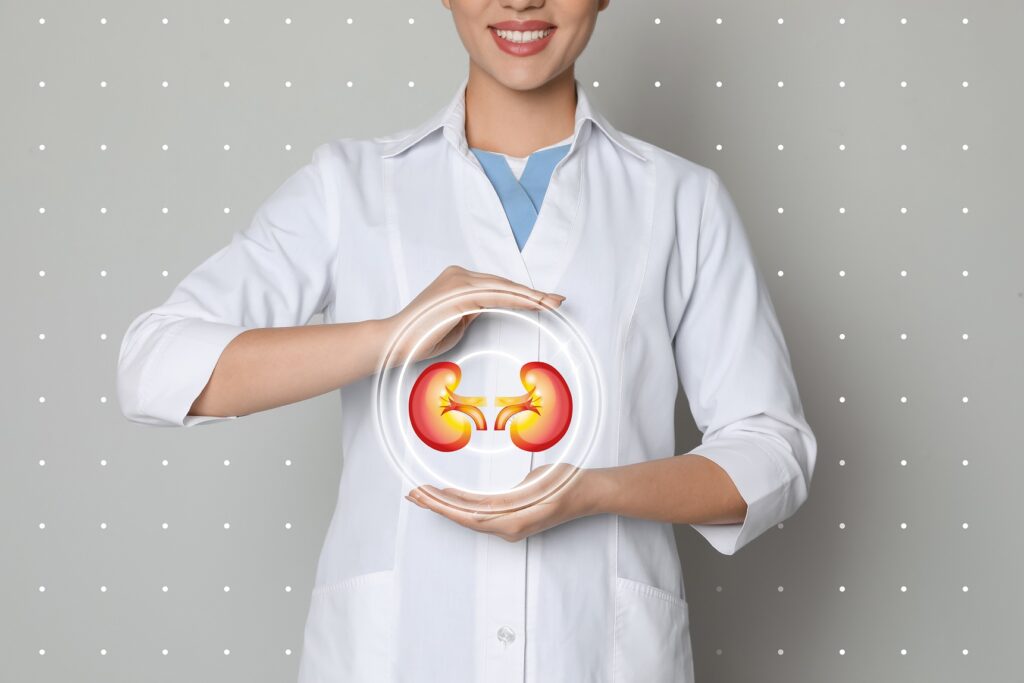
Causes and Risk Factors of Kidney Cancer

Smoking tobacco doubles the risk of kidney cancer. Harmful substances in cigarettes get into the bloodstream and can affect the kidneys, leading to cancerous changes.
Excess body weight may cause changes in certain hormones that can lead to kidney cancer.
Having high blood pressure (hypertension) can increase the risk of kidney cancer, though it’s not entirely clear why. Medications used to treat high blood pressure may also play a role.
If you have a family member, especially a sibling, with kidney cancer, your risk may be higher. This could be due to inherited conditions or shared environmental factors.
Some genetic conditions increase the risk of kidney cancer, including von Hippel-Lindau disease, Birt-Hogg-Dubé syndrome, and hereditary papillary renal cell carcinoma.
Long-standing kidney problems, especially those requiring dialysis, can increase the risk of developing kidney cancer.
Workplace exposure to certain substances, like asbestos, cadmium, some herbicides, and organic solvents, particularly trichloroethylene, may increase the risk of kidney cancer.
Men are about twice as likely as women to get kidney cancer. This may be related to rates of smoking and other risk factors that are more common in men.
Black people have a slightly higher risk of kidney cancer than people of other races.
Long-term use of certain pain medications, especially non-aspirin nonsteroidal anti-inflammatory drugs (NSAIDs), may increase the risk of developing kidney cancer.
People with advanced kidney disease, especially those on long-term dialysis, have a higher risk of kidney cancer.
Symptoms of Kidney Cancer
The presence of red blood cells in urine, causing a pink, red, or cola color, is a key indicator of kidney cancer.
Persistent pain on one side of the lower back, not due to injury, often emerges as the cancer enlarges.
A detectable mass in the abdomen or back may indicate an enlarged kidney from a tumor.
Unintentional weight loss is common in kidney cancer, as with many cancers.
Excessive tiredness without obvious cause can signal kidney cancer among other conditions.
Recurring, unexplained fevers may be linked to kidney and other cancers.
Tumor-related blockages can cause swelling in the legs or ankles.
Kidney cancer can lead to anemia by causing blood loss in urine or affecting kidney function, resulting in fatigue and paleness.

Stages of Kidney Cancer
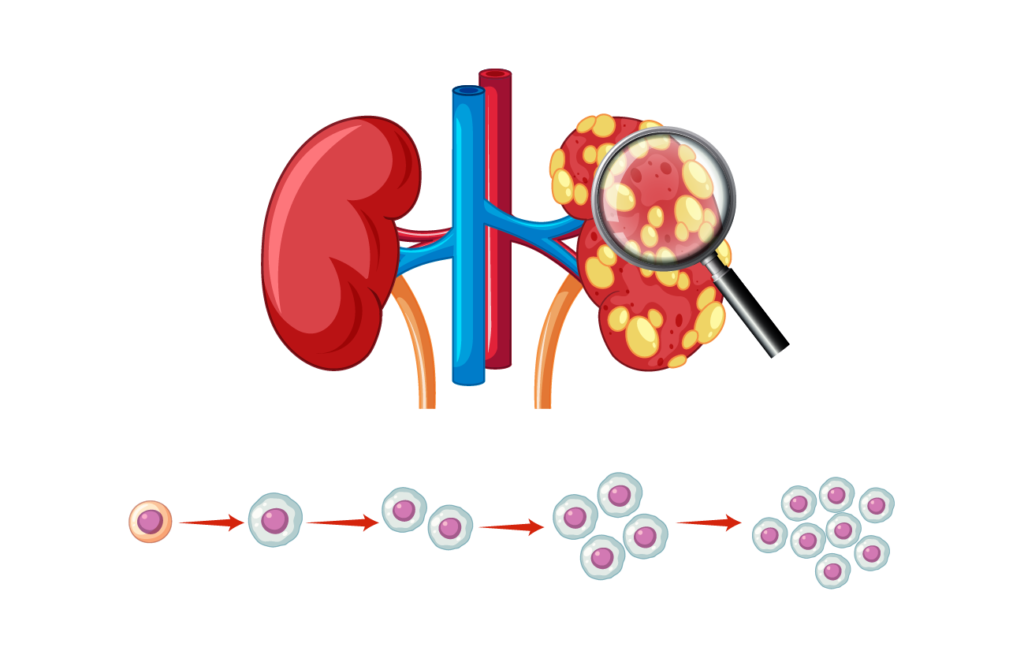
The tumor is 7 cm (about 2.8 inches) in diameter or smaller and is confined to the kidney. It hasn’t spread to lymph nodes or distant organs.
The tumor is larger than 7 cm but still only within the kidney. It hasn’t spread to lymph nodes or distant organs.
This stage has a few scenarios:
- The tumor has grown into major veins or the tissue surrounding the kidney, but not beyond Gerota’s fascia (the protective layer surrounding the kidney and adrenal gland).
- Cancer may have spread to nearby lymph nodes but not to distant organs.
The most advanced stage, where the cancer has one or more of the following characteristics:
- It has spread beyond Gerota’s fascia, involving nearby organs except the adrenal gland on the same side as the affected kidney.
- It has spread to distant lymph nodes or organs, such as the lungs, liver, bones, or brain.
head 8
Administering high-dose Vitamin C intravenously, this therapy is explored for its potential to produce hydrogen peroxide, which may target cancer cells, enhance life quality, and mitigate side effects of traditional treatments.
An innovative therapy where patients inhale molecular hydrogen gas, leveraging its antioxidant properties to potentially reduce oxidative stress in cancer cells. Its efficacy and safety in humans are subjects of ongoing research.
Involves breathing pure oxygen in a pressurized environment, believed to enhance tissue oxygenation and aid healing. Used cautiously in cancer care to potentially improve chemotherapy and radiation effectiveness and manage side effects.
Utilizes extracts from the European mistletoe plant, injected to possibly stimulate the immune system and exert cytotoxic effects on cancer cells. While popular in Europe for quality of life improvement, its scientific validation remains mixed.
An ancient Indian practice focusing on body system balance through diet, herbal treatment, and yogic breathing. Aimed at detoxification, boosting defense mechanisms, and overall well-being, it complements conventional treatments despite limited clinical trial evidence.

Treatment Options for Kidney Cancer

- Partial Nephrectomy: This “kidney-sparing” surgery removes only the tumor and a small border of healthy tissue. It’s ideal for small tumors or when it’s crucial to preserve kidney function, such as for patients with a single kidney or kidney disease.
- Radical Nephrectomy: This procedure entails removing the entire kidney, some surrounding tissue, and possibly the adrenal gland and nearby lymph nodes. It’s typically used for larger tumors or when cancer has spread to adjacent tissues.
- Laparoscopic and Robotic-Assisted Surgery: Minimally invasive approaches for partial or radical nephrectomies, involving small incisions for inserting instruments and a camera. Robotic assistance enhances precision and control, generally resulting in less pain and faster recovery than open surgery.
- Cryotherapy and Radiofrequency Ablation (RFA): Less invasive options for small tumors or patients unsuitable for surgery. Cryotherapy freezes cancer cells, while RFA uses heat to destroy them, both guided by imaging techniques like ultrasound or CT.
Focuses on specific genes or proteins involved in cancer growth.
- Monoclonal Antibodies: Bind to cancer cell molecules, blocking growth or aiding immune response.
- Tyrosine Kinase Inhibitors: Block enzymes promoting cancer cell growth.
- Proteasome Inhibitors: Hinder protein breakdown needed for cancer cell survival.
- Histone Deacetylase Inhibitors: Affect gene expression regulation in cancer cells.
Enhances the body’s immune response against cancer.
- Checkpoint Inhibitors: Unblock immune cells to attack cancer.
- Monoclonal Antibodies: Target specific cancer cells.
- Cancer Vaccines: Train the immune system to recognize cancer cells.
- Adoptive Cell Therapy: Modifies patient’s immune cells to better fight cancer.
- Oncolytic Virus Therapy: Uses viruses to target and destroy cancer cells.
Uses high-energy beams to kill or halt cancer cell growth.
- External Beam Radiation Therapy (EBRT): Directs radiation from outside the body.
- Internal Radiation Therapy (Brachytherapy): Places radioactive material near cancer cells.
- Systemic Radiation Therapy: Uses radioactive substances in the blood.
- Proton Therapy: Utilizes protons for precise targeting.
Customizes treatment based on genetic profiling of cancer.
- Genomic Sequencing (NGS): Identifies specific mutations for targeted therapies.
- Chemosensitivity: Tests cancer cell response to chemotherapy drugs.
- RNA Sequencing: Analyzes gene expression for targeted interventions.
- Tissue Banking: Stores samples for future research.
- Circulating Tumor Cell (CTC): Monitors disease progression through blood analysis.
- Metabolic Therapy: Targets cancer cell metabolism through dietary changes.
Complementary approaches focusing on well-being and symptom management.
- Diet and Nutrition: Emphasizes whole foods and anti-inflammatory items.
- Herbal Supplements: Includes evidence-based herbs for cancer care or symptom relief.
- Mind-Body Therapies: Practices like meditation, yoga, and tai chi for stress reduction.
- IV Vitamin C: High-dose therapy with potential benefits but not widely accepted.
- Hydrogen Inhalation Therapy: Emerging approach with antioxidant properties.
- Hyperbaric Oxygen Therapy (HBOT): Enhances chemotherapy and radiation efficacy, with cautious use.
- Mistletoe Therapy: Used for immune stimulation and quality of life improvement.
- Ayurvedic Medicine: Focuses on holistic care, often alongside conventional treatments.
Each treatment option is chosen based on individual patient factors, cancer stage, and overall health, offering a comprehensive approach to kidney cancer management.
